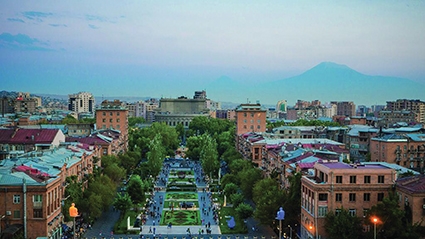Why Armenia is Important for Russia
Again on Armenia. Protests are ongoing and the situation could easily swing in any possible direction. There are indications that the ruling Republican Party might collapse and new elections follow.
Whatever the result in the near future, one thing is clear: although it has become fashionable to portray the Armenian mass protests as non-geopolitical, the pressure on the still ruling government is nevertheless bound to raise some geopolitical questions, such as how relations with Russia will develop and what the impact will be, if any, on the Nagorno-Karabakh issue under the new leadership.
Here, it is important to outline the basic Russian strategy in Armenia. For Moscow, Armenia is important as it serves as a fore post of Russian military and economic influence in the South Caucasus and also a certain tool for influencing Turkey and Iran’s policies in the region.
Russia has a military base in Armenia, and from a strategic point of view, Moscow has retained the military perimeter it enjoyed in Soviet times.
The long-term Russian strategy is quite simple: to have as many military bases in the region as possible. The military base in Armenia is crucial for forestalling a Western military presence in the South Caucasus, specifically in Georgia. Indeed, a simple glimpse at the South Caucasus map reveals how the Gyumri base, together with military bases in Samachablo (so called South Ossetia) and Abkhazia virtually encircle Tbilisi. This is important when we discuss NATO expansion in the South Caucasus and how this could potentially result in direct Western military confrontation with Russian troops.
Armenia is also important for Russia as it can potentially serve as yet another land corridor to Iran, together with the Caspian Sea and the land through Azerbaijan.
Losing Armenia, for Russia, would mean foundational changes in Moscow’s influence in the South Caucasus. Armenia without Russia would mean a much stronger Azerbaijan. The latter, because of Russian presence in Armenia and the domination in the Nagorno-Karabakh resolution process trying to play a balancing game in its foreign policy.
Armenia without Russia means a militarily less hesitant Azerbaijan, which will signal the start of renewed hostilities around Nagorno-Karabakh. In that scenario, Yerevan is likely to face difficulties defending its positions.
Undermined Russian positions in Armenia are thus directly related to Russia’s ability to influence Azerbaijan. Azerbaijan, due to its strategic position on the Caspian Sea, between Russia and Iran, and being a source of large gas and oil export potential, will have a more invigorated foreign policy if Russia weakens its hold on the Nagorno-Karabakh process.
It will almost have a domino effect. A stronger Azerbaijan will re-invigorate talks around the Trans-Caspian Pipeline (although, admittedly, this process is also influenced by other factors such as a Russia military presence in the Caspian Sea). Georgia, too, will be less frightened and will be ever more vocal in its pro-western aspirations. A weaker Russia in the South Caucasus will also increase Turkey’s positions in the region and enhance the important Turkey-Georgia-Azerbaijan trilateral format.
Thus, in continuation of what I wrote for GT’s previous edition, it is for the moment very unlikely that Armenia’s foreign policy would be put into question. Even the protest leader Pashinian noted in one of his press-conferences that no big geopolitical changes would be taking place for Armenia.
The Russians would be very keen to keep Armenia under their wing, limiting possibilities for Yerevan to diminish the Kremlin’s influence in the country. Moreover, many, if not the majority, of the Armenians themselves understand quite clearly that it will be extremely tough for the country to withstand a two-pronged alliance of Turkey and Azerbaijan. The very security of Armenia depends on how powerful the Russian troops are in Gyumri.
True, a new government as a result of protests might indeed be based on very sincere national sentiments, but they are nevertheless bound to raise fundamental – geopolitical – questions, such as potential foreign policy reverberations. Armenia is no exception.
By Emil Avdaliani












